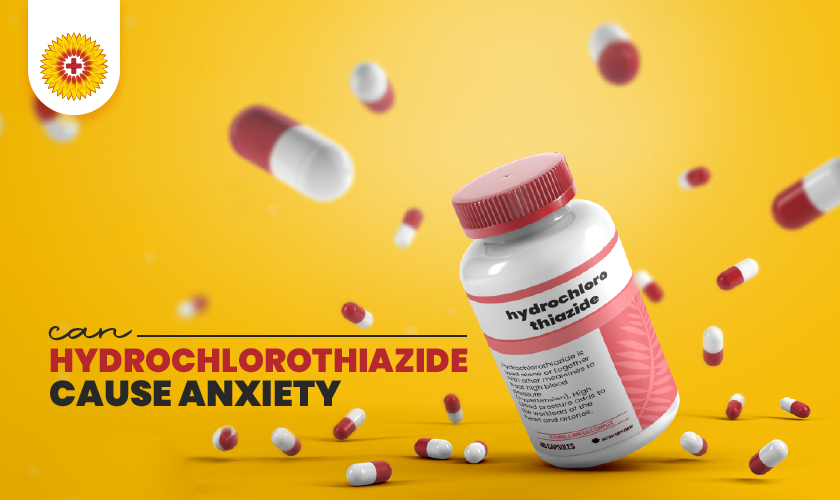Can hydrochlorothiazide cause anxiety, and do you feel concerned about it?
Hydrochlorothiazide, commonly prescribed for high blood pressure and excess body fluid, might raise concerns about its effects, including anxiety.
At Urgent Care of Kansas, we’re here to give you answers to your queries so you can make informed choices about your health.
So, let’s take a closer look at the medication and its possible side effects.
Understanding Hydrochlorothiazide
Medical professionals give hydrochlorothiazide to their patients as a prescription drug.
It is for people who have too much water in their bodies and high blood pressure.
This hydrochlorothiazide Davis drug helps the body get rid of extra water and salt by making you pee.
Furthermore, it can help manage the blood pressure.
Sometimes, drinking too much water can also make you swell up. Therefore, it is safe to take this medicine as your doctor tells you to.
Hypertension – Hydrochlorothiazide is Used For It
Hypertension is treated with hydrochlorothiazide.
It is also used to treat swelling that comes from having heart failure, cirrhosis of the liver, or taking corticosteroids or estrogens.
In addition, it might help treat swelling caused by kidney problems.
This medication may be used separately or in combination with other drugs.
For more information about the conditions that hydrochlorothiazide is used to treat, visit Urgent Care of Kansas to receive Primary Care and learn more about this medication.
Can Hydrochlorothiazide Cause Anxiety?
Many doctors prescribe hydrochlorothiazide, a thiazide diuretic, to treat swelling and high blood pressure.
Although anxiety is not listed as a common side effect of hydrochlorothiazide, some people might experience mental symptoms like anxiety while taking this drug.
According to a National Library of Medicine and National Institutes of Health study, hypertension is linked to panic disorder, anxiety, and depression.
It is important to note that hydrochlorothiazide rarely causes anxiety.
Please consult your doctor if you experience anxiety or other side effects while taking hydrochlorothiazide.
They can evaluate your symptoms and adjust your treatment plan accordingly.
Follow the doctor’s instructions when taking this medication and report any serious side effects.
Here are some facts about hydrochlorothiazide and anxiety:
Possibility of Anxiety:
Some people experience anxiety as a side effect, but not all.
Imbalance Impact:
Electrolyte balance could be thrown off, which could make you feel anxious.
Dehydration Concern:
Increased urination can cause dehydration, which can have a negative effect on mental health.
Previous Health Issues:
A person who has had an anxiety disorder in the past may be more likely to experience anxiety as a side effect.
Interaction Risks:
There may be a higher risk of anxiety when taking hydrochlorothiazide with other drugs.
Instructions for Taking Hydrochlorothiazide
Dosage Guidelines:
- Follow your doctor’s instructions and take them consistently.
- You can take it with or without food, but maintain regular timing.
- Stay hydrated by drinking enough water while on this medication.
Dosage for High Blood Pressure:
- Adults (18 to 64 years old): Typically start with 12.5 mg or 25 mg once daily, potentially increasing to 50 mg if required.
- Children (12 to 17 years old): Generally begin with 25 mg once daily, possibly increasing to 50 mg based on the doctor’s evaluation.
Understanding Dosage:
- Regular Adult Dosage: Ranges from 25 to 100 mg daily, taken once or twice daily.
- Flexible Treatment: Some may opt for intermittent dosing to minimize potential chemical imbalances.
Hydrochlorothiazide’s Appearance:
- Commonly appears as round, white tablets.
- Variations in appearance may exist among different brands.
- Specific imprints or colors might distinguish certain versions.
- It’s advisable to confirm the pill’s appearance with a pharmacist or healthcare provider.
Side Effects of Hydrochlorothiazide:
As with any medication, hydrochlorothiazide can lead to side effects, particularly if taken excessively. Some common side effects might include:
- Increased urination.
- Dizziness or lightheadedness.
- Muscle cramps or weakness.
- Upset stomach or diarrhea.
- Low levels of potassium.
Not everyone experiences these side effects, and some individuals may not encounter any.
It’s advisable to seek medical advice if you notice any side effects or have concerns about your medication.
Conclusion
Hydrochlorothiazide is commonly prescribed to manage high blood pressure as a diuretic, but the question is, can hydrochlorothiazide cause anxiety?
It might cause symptoms of anxiety rarely in some cases, but not everyone experiences anxiety when taking hydrochlorothiazide.
However, it is important to be aware of this possible effect and let your healthcare provider know right away if your anxiety levels rise.
We are here at Urgent Care of Kansas to help you through this process.
We can help you figure out how your medication is affecting you and make a treatment plan specifically for you.
FAQs
1: Can I take vitamin D with hydrochlorothiazide?
Most of the time, taking vitamin D with hydrochlorothiazide is safe.
Before mixing medications or supplements, consult your doctor to avoid interactions or side effects.
2: Can hydrochlorothiazide cause low sodium?
The diuretic hydrochlorothiazide can lower sodium levels in some people. If you are concerned about your sodium levels, you should consult your doctor.
4: Which is safer, chlorthalidone or hydrochlorothiazide?
These two medicines, chlorthalidone and hydrochlorothiazide, are both diuretics that are used to treat high blood pressure.
Both are generally safe, but how well they work, and any side effects that might happen can be different for each person.
Consult a doctor to determine which option is safest and best for you.
3: Can urgent care prescribe anxiety medications?
Urgent care centers can look at anxiety symptoms and give you short-term relief.
However, the prescription of anxiety drugs may be different depending on how bad the symptoms are and the rules of the specific urgent care center.
For long-term care, it is common to keep in touch with a primary care doctor or mental health specialist.



No comment